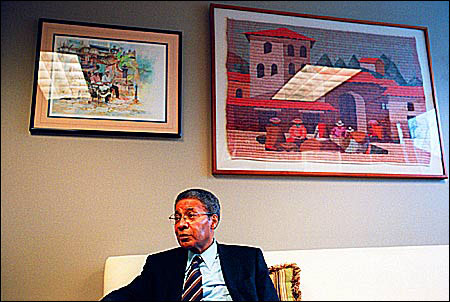Decades of dedication
Alvin Poussaint helped transform makeup of Medical School student body

Some years ago, a student who had graduated with excellent grades from one of the traditional black colleges applied for admission to Harvard Medical School (HMS). Alvin Poussaint, faculty associate dean of student affairs, urged the admissions committee to accept him, but many were skeptical.
“It wasn’t racism,” Poussaint said. “They just didn’t know how to evaluate people from certain institutions. Someone suggested that an A from this school might only be worth a C from an elite college.”
With Poussaint’s support, the student got in, although some of the committee members expressed doubts about whether he would be able to handle the work.
“Well, he ended up graduating cum laude. He earned a second degree along the way, and he got one of the top internships in the country. That was a turning point. After that, the School began to take a broader view of the admissions process. Now we take students from places even I’ve never heard of.”
Helping to transform the Medical School into a more diverse, open-minded institution is only one of the ways in which Poussaint has exerted a positive impact on Harvard and on the world. As an activist who provided medical attention to Civil Rights workers in the South, as a psychiatrist who has given black families the insights they need to raise healthy children in a society that does not always support their efforts, as a critic who has raised awareness of the impact of the media on children and minorities, Poussaint has been an effective force for change for over forty years.
Harvard Medical School Dean Joseph B. Martin said of Poussaint, who joined HMS in 1969, “For more than three decades Al Poussaint has made remarkable contributions to turning Harvard Medical School into a place where the student body not only mirrors the society in which we live, but also is a place that nurtures its minority students. The results of his actions have enriched the practice of medicine in Boston and throughout the nation.”
On Feb. 12, Poussaint’s family, friends, colleagues, former students, and others whose lives he has touched will gather to celebrate his contributions. Special guests will include Bill Cosby, whose popular sitcom “The Cosby Show” (1984-1992) benefited from Poussaint’s work as a consultant. Family friend James Taylor will also attend and perform.
Cosby, whom Poussaint met during their involvement in the Civil Rights struggle, hired him to provide a perspective on the show that could only come from someone who was both an expert on psychological issues and an African American. Poussaint reviewed all scripts and made comments and suggestions before the episodes went into production. Poussaint was also a consultant on the show’s spin-off, “A Different World.”
“The writers weren’t used to having their scripts vetted by a psychiatrist, but we learned to work together and eventually we developed a sense of family.”
Cosby and Poussaint agreed that the show would be plot-driven rather than relying on one-liners and would avoid put-downs and negative humor. They also agreed that there would be a strong emphasis on education, a choice that was behind the college sweatshirts Cosby often wore on the show. Many colleges sent Cosby shirts to wear, which he was only too happy to do, particularly those from historically black schools. Many of these schools reported that applications rose dramatically as a result of this exposure.
As director of the Media Center of the Judge Baker’s Children’s Center, Poussaint continues this work through his consulting, writing, and project development.
A professor of psychiatry at the Medical School, he is the co-author with James P. Comer, M.D., of “Raising Black Children” (1992), and co-author with Amy Alexander of “Lay My Burden Down” (2000), a study of mental illness and suicide among blacks.
As faculty associate dean of student affairs, Poussaint not only works toward the recruitment of minorities but serves as a counselor and facilitator for all racial and ethnic groups within HMS. One of his continuing efforts is to encourage individuals and groups to express themselves if they feel they are being discriminated against.
“Groups have a responsibility to speak up and educate other people. No one else is going to tell us.”
Poussaint’s aim, however, is not for the student body to split off into exclusive ethnic enclaves, but to encourage students to get to know one another and develop cross-group ties. To this end, he encourages student organizations to welcome those of different backgrounds, an effort that has led to some stunning and encouraging breakthroughs.
“Three years ago, the Student National Medical Association, a predominantly black student organization, selected a blond white woman to be its president. The fact that the black students could do that really impressed everyone.”




